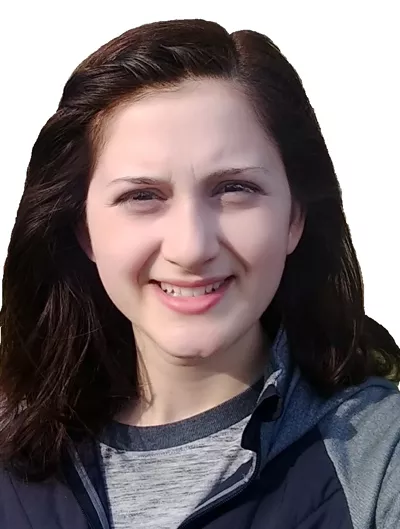
Name: Kate Gold
Class Year: 2021
Major: Mathematics
Hometown: Chambersburg, Pa.
Internship Organization: Department of Physics and Astronomy at Swarthmore College
Job Title: Research intern
Endowed Internship Funding Award: Joan Chang Wong 1956 Memorial Internship Fund
Location: Swarthmore, Pa. (remote)
What’s happening at your internship?
This summer I worked as an undergraduate research assistant in the Department of Physics and Astronomy at Swarthmore College under the supervision of Professor Deborah Schmidt. This work extends Professor Schmidt’s previous work of planetary nebulae (PNe). With goals of further understanding the molecular content of PNe, we used the Sub-millimeter Telescope (SMT) on Mt. Graham and 12-m Telescope at Kitt Peak, both facilities of the Arizona Radio Observatory, to observe the J=3-2 and J=1-0 transitions of HCN and HCO+ in 13 PNe.
I also had several side tasks that were very informative and fun; these included a journal club, working through and improving a set of introductory Python notebooks, figure-making and several other coding tasks, and writing a proposal to request future telescope time on the Sub-millimeter telescope in Arizona.
Why did you apply for this internship?
I applied for this internship because I have really enjoyed my undergraduate astronomy coursework and I wanted to strengthen my astronomy minor with more experience. I knew it would be valuable (and fun!) to have a hand in a research project over the summer. Looking back at my application, I wrote extensively about improving my technical writing, researching skills, coding, and further developing my interests. I applied to learn a subfield astronomy which is not taught in the Bi-Co curricula. Finally, I figured this experience might give me the confidence I need to apply to grad schools and see a research career in astronomy as a possibility, not a dream. Having finished my work at this point, this experience has exceeded my expectations in these areas, and I feel blessed to have been able to learn each step of the process.
Was there anything special about how you found this internship?
Yes, absolutely. I am thrilled to have been able to participate in this work! I remember once in the fall of my junior year I came across an introductory textbook on astrochemistry and ran to my advisor to see if I could read it independently. I have a strong background in chemistry and a firm interest in astronomy and it seemed to be the perfect match for me. We decided then that I might be able to read this text in the spring as an independent course if there was a professor able to work with me and I had room in my schedule. Come the spring, I wasn’t able to study the text independently but details for summer work in astrochemistry slowly fell into place.
In January, I started my making plans for the summer with an inquiry of whether any astronomy professor would take on a remote student—I needed to be in my home town this summer for personal reasons. So early in the year, everyone was reluctant to think about remote options (ironic, isn’t it?) but fortunately, and with the help of my advisors, an opportunity arose to work remotely with a new hire at F&M. The new hire ended up being my professor, Deborah Schmidt, who worked at Swarthmore previously. My coursework with her in the spring was super useful in getting started. There's also something to be said that astrochemistry is somewhat uncommon so it was beyond my expectations to have the opportunity to participate in such work.
What is most rewarding about your internship?
There are two things which come to mind as most rewarding. First, I loved the wide range of events I was able to participate in. In addition to the work described above, I joined weekly “astrochemistry discussions,” hosted by grad students and professors from around the world. I was also able to watch many talks in a Central Pa. astronomer’s event held at F&M this year. These would not have been available without the recommendation of my advisor and I am glad to have been invited. Second, I enjoyed practicing technical writing, such as in the KNAC conference proceeding paper and proposal for additional telescope time. It is so satisfying to share results and the outcomes of many hours of hard work and troubleshooting.
Visit the Summer 2020 Internships page to read more student stories.